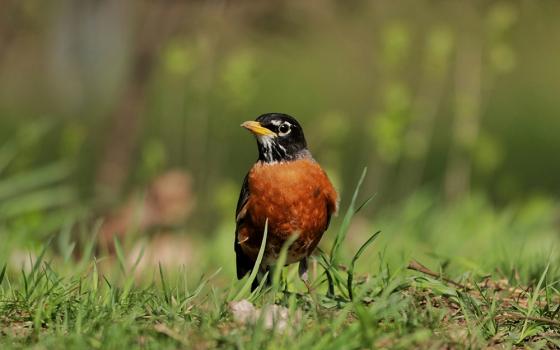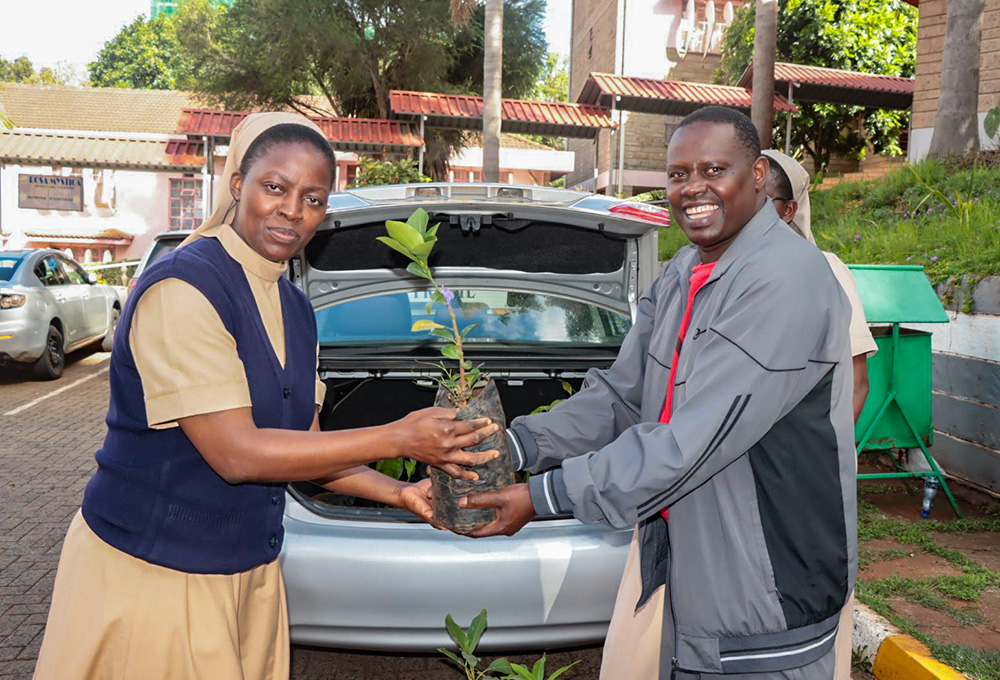
Sr. Jecinter Antoinette Okoth, the local superior of the Rosa Mystica Community of the Franciscan Sisters of St. Anna, receives a donation of trees from Fr. Paul Igweta, coordinator for promoting integral human development with the Association of Member Episcopal Conferences in Eastern Africa, during Kenya's national tree planting day on Nov. 13, 2023. (Henriette Owino)
As global climate concerns grow, faith-based actions and concrete commitments have become crucial in addressing environmental challenges. Congregations around the world have been actively responding to Pope Francis' call for transformative environmental stewardship. We asked our panelists this month:
How is your community implementing the recommendations of Pope Francis' apostolic exhortation Laudate Deum regarding the climate crisis?
_____
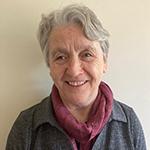
Ann Gray is from Scotland and has served as a lay missionary in Sierra Leone and as a Missionary Sister of St. Columban in Hong Kong, where she studied Cantonese and co-established Action for REACH OUT, an organization providing services to female sex workers on the streets and in the nightclubs of Hong Kong. After a short time in China studying Mandarin, she was elected congregational leader. Since completing her term in leadership, she has been in Ireland working on the development of congregational spirituality.
Here in Ireland, in our motherhouse, we have a sharp reminder of the climate crisis and the devastation that surrounds our planet as we feel a deep sadness this year that so few swallows and swifts have returned to nest here.
In the first page of Laudate Deum, Pope Francis states, "With the passage of time, I have realized that our responses have not been adequate, while the world in which we live is collapsing and may be nearing the breaking point."
Reading the above, while agreeing with what Pope Francis states, it would be easy to give in to despair and to give up. When he published his encyclical letter "Laudato Si', on Care for Our Common Home," our congregation commissioned our first Laudato Si' group consisting of five sisters, each one on mission in different parts of the world. We are inspired and encouraged through their sharing with us the different efforts being made throughout the congregation to respond to the urgent cry of Mother Earth.
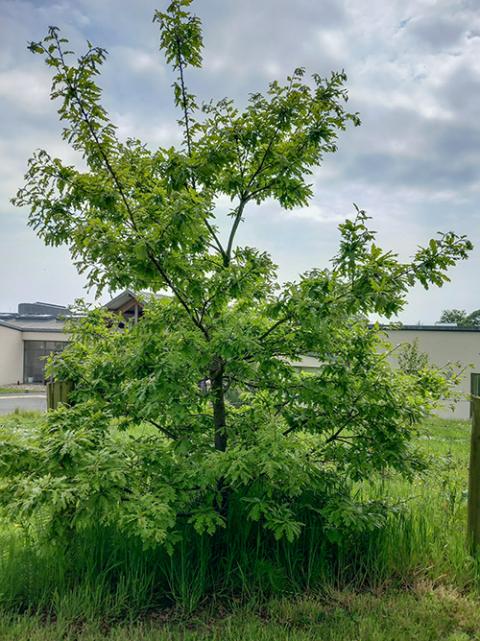
An oak tree planted in the grounds of the motherhouse of the Missionary Sisters of St. Columban in Wicklow, Ireland (Ann Gray)
We are working with local people to plant trees in desert areas, and encouraging the growing of vegetables on balconies in places where large plots of land are not available. And, of course, throughout the congregation, from the youngest sister to our 102-year-old, we are enthusiastically recycling and composting. We have also been frequently invited and agreed to become Laudato Si' animators who are initiating and developing continuous action plans both for the congregation and for the communities in which we live.
A few months ago, we decided that as part of the celebrations of the centenary since the foundation of our congregation, we would participate in the 100 Million Trees Project, the goal of which is to plant 250,000 Irish native trees throughout the island of Ireland over the next decade. The aim is to reverse the immense environmental damage caused by the reduction of forests worldwide, which, as we all know, leads to the loss of huge areas of biodiversity.
Our plan toward the end of last year was to offer 5 acres of our land for this project. But, once again, unseasonable heavy rain meant that the earth was too wet to plough so the project has had to be postponed till the end of this year.
Undaunted, we did plant a single oak as a symbol of our concern, with a prayer that this tree will serve as a living witness to our commitment to heal our common home through long-lasting, bold changes.
Meanwhile, keeping in mind that 'mighty oaks from little acorns grow' and as a small symbol of my love for trees, I will continue each autumn to collect and plant acorns that have fallen from some of our majestic oak trees here and watch with wonder and hope as some of them mature into mighty oaks.
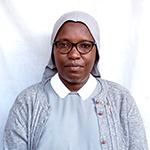
Beatrice Kamau is a Kenyan from the Congregation of the Daughters of St. Anne and is a regional superior for its Kenya delegation. She is a trained catechist, formator and a counselor. She has served as novices' formator and occasionally presents workshops to congregational leaders in Kenya, Uganda and Tanzania for the program Professional Development of Congregational Leaders. She also does part-time counseling.
We acknowledge with appreciation the church's effort in promoting and keeping faithful the responsibility and mission given to human beings to care for the Earth. "The Lord God took man and put him in the Garden of Eden to work in it and to take care of it" (Genesis 2:15). In spite of humans failing to take this call seriously, the church offers relevant proposals to enhance and make our common home — the Earth — a place where all can feel that sense of belonging, ownership, accountability and responsibility for its well-being.
Pope Francis' Laudato Si' and successively Laudato Deum emphasize to us the possible ways to handle the climate crisis and protect our common home.
The church offers relevant proposals to enhance and make the Earth a place where all can feel that sense of belonging, ownership, accountability and responsibility for its well-being.
My community has taken this recommendation with agility and a sense of creativity, taking practical interventions to promote environmental stewardship and sustainability. As a community currently, we are promoting and transitioning to renewable energy initiatives by installing solar panels. This not only reduces our carbon footprint, but also serves as a practical example for residents on the benefits of renewable energy.
We have installed solar panels that power our borehole, significantly lowering electricity bills and reducing reliance on fossil fuels.
Moreover, we have employed healthy agricultural practices such as crop rotation. We have reduced the use of chemical fertilizers and pesticides; this is because chemicals are harmful not only to Mother Earth but also to human beings and animals. These practices have helped in retaining healthy soil and boosting Mother Earth to generate and regenerate.
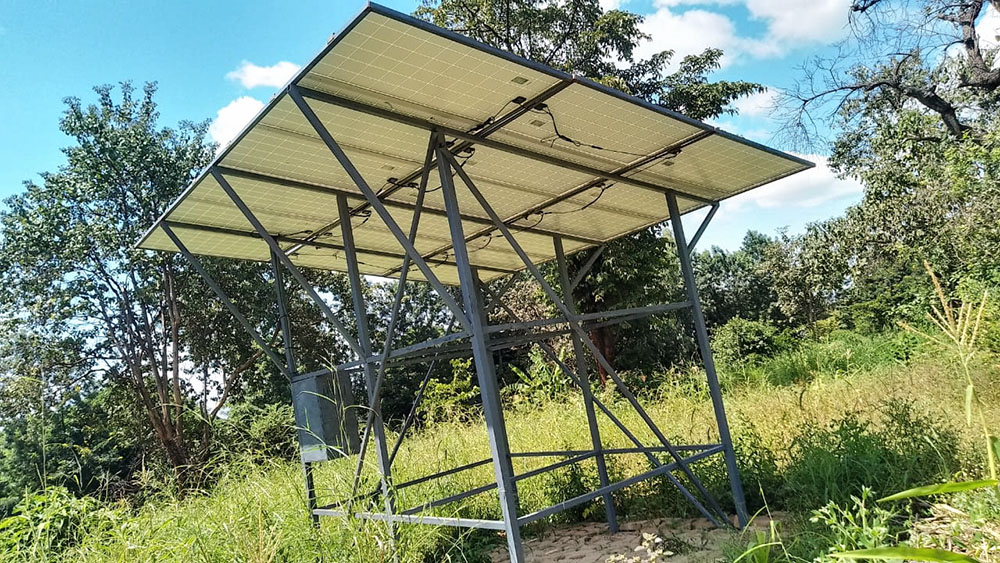
Solar panels power the borehole in Mashuru Community in Kajiado County, Kenya. (Courtesy of Beatrice Kamau)
Currently, to ensure ongoing formation concerning care of the Earth, we run capacity-building programs on how to implement recommendations through community workshops, seminars and mentorship programs for learners and students in our schools, as well as the local community. These programs aim at creating awareness of the dangers of not caring for and protecting our common home, and teaching sustainable practices that are economically friendly, such as water-saving techniques, plastic recycling and afforestation.
Our communities have participated in advocacy and regulations on care and protection of our ecosystem, so that we can continuously foster strong teams to handle climate crises and have a common ground, which will guide us if facing climate challenges.
As a community, we feel this is our noble responsibility through which we are responding to the call of God to go out and pro-create. This is the mode in which we can directly participate in the promotion of God's creation, hoping that we can leave this Mother Earth a better place for the next generation.

Pouiwindin Chantal Ouedraogo, a Dominican Sister of the Presentation, is from Burkina Faso. She holds a bachelor's degree in philosophy and letters and a teaching certificate. She has 10 years' experience teaching in primary schools, the majority spent teaching in Burkina Faso. In 2022, she was missioned to Cameroon, and for the past year, she has taught primary school in Mokolo, in the far north region of Cameroon. She also has been involved in pastoral activities that support young people.
Since the appearance of the document Laudato Si' of His Holiness Pope Francis, several actions have been taken within our congregation: study of the document, awareness-raising among the sisters, and implementing beneficial actions to help reduce global warming.
Laudate Deum boosts our commitment to the maintenance of our common home that is the Earth. In our community in particular, concrete actions are being implemented.
We sort waste. We have three bins in the community: one for peelings, which will be used to feed the animals; another for paper to be burned, and the last one for plastics that we keep to give to those who transform plastics into bags, shoes, etc.
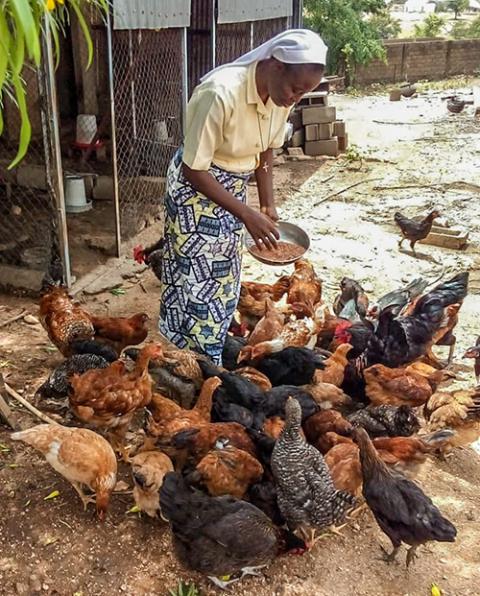
The Dominican Sisters of the Presentation in Cameroon raise chickens, sheep and pigs for local consumption and use the animals' waste as fertilizer. (Courtesy of Pouiwindin Chantal Ouedraogo)
We raise chickens, sheep and pigs. This activity is not for profit, but for local consumption. Still aiming for organic consumption, the waste from these animals is stored in a pit during the dry season to be returned to our field during the winter season. We use this same organic fertilizer for our vegetable garden. This prevents us from consuming foods made with pesticides or other chemicals that are harmful to our health.
Also, to avoid consuming fruits on the market that are often forcibly ripened through the use of chemicals, we have begun planting fruit trees. A variety produces in the dry season and another produces in the rainy season.
We do our shopping at the market with degradable organic bags to avoid, as much as possible, the plastic bags that pollute the city. This is our way of raising awareness through action.
With the support of the Faith and Justice Association, created by the major superiors of all the congregations present in Cameroon, we benefit from environmental training once a quarter. Each sister is responsible for a sector of our parish where she raises awareness about the maintenance of our common home.
This activity educates people about the danger of global warming, improving the local sanitation system by unblocking gutters, channeling runoff water, making natural compost for the fields, and ensuring cleanliness around homes.
We also initiated a reforestation policy with our students at school, requiring each student to plant a tree in their family yard and maintain it. Each class teacher is responsible for monitoring and carrying out this activity. This initiative was a great success; out of a total of 1,406 students, we counted 1,302 well-maintained plants.
Each couple who gets married in our parish receives from us a plant as a wedding gift. They are encouraged to plant and care for this tree in their family.
During our training outings and interactions with the community, we have observed that many people are still unaware of the real dangers facing our world in this global warming. Others are aware but have not taken concrete action. We hope that one day everyone will join in the effort to save our common home.
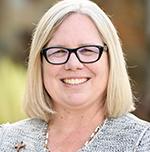
Linda Buck is a Sister of St. Joseph of Orange, California. Her ministry is informed by transformative leadership, psychology, theology and transformational social change. She uses her academic and experiential background to promote culture change within current and emergent systems, including religious life. She is the executive director for the Leadership Collaborative. Prior to this, she was director of initial formation/novice director for her congregation, a psychotherapist and spiritual director.
The human family and all of creation are experiencing another year of unprecedented environmental crisis and mass migration due to climate change. I imagine God as a young child watching a scary movie, hands over eyes, peeking through to see if the heroic characters have made it through the worst of the scene. More likely, we are the ones who have our hands over our eyes.
Pope Francis' clear call to action in Laudate Deum — if Laudato Si' was not enough — reminds us that we think of ourselves as the heroic figures in the movie: "For when human beings claim to take God's place, they become their own worst enemies."
He explains, "The climate crisis is not exactly a matter that interests the great economic powers, whose concern is with the greatest profit possible" The Earth and those experiencing poverty suffer because of these economic powers.
Economic and governmental powers have colonized the environment. We see, once again in our history, how those with power take the place of God, crafting creation to their purposes.
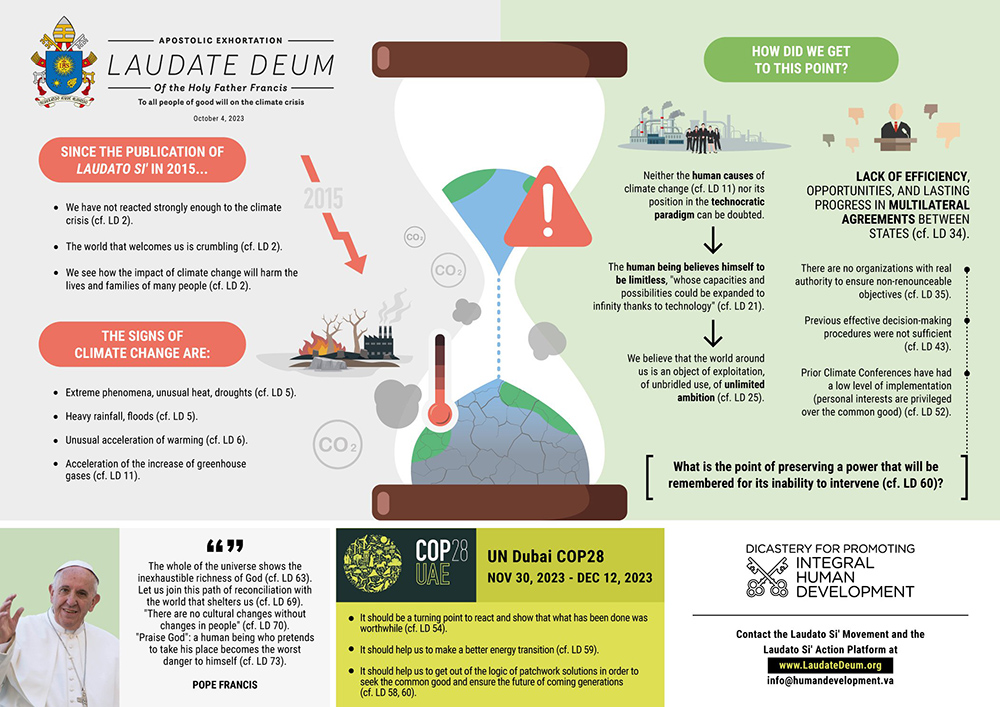
The Dicastery for Promoting Integral Human Development published this infographic Oct. 4, 2023, marking the release of Pope Francis' document on the climate crisis, Laudate Deum. (CNS/Dicastery for Promoting Integral Human Development)
What is so striking is the drastic shift during the COVID-19 pandemic. Data from NASA summarized the positive environmental implications that resulted from the pandemic. The limitations on travel and other economic sectors decreased air pollution and greenhouse gas emissions within just a few weeks around the globe. That sudden change gave scientists an unprecedented view of results that would take regulations years to achieve.
Now that the pandemic is lessening, with only periodic outbreaks, we are seeing these results diminish and disappear.
I live in the United States, one of these economic and governmental powers to which Francis speaks, and individually I try to make choices that will lessen my footprint. Are my individual actions enough?
I reflect on my own complicity through the choices I make. Over the past 30-plus years, my congregation, the Sisters of St. Joseph of Orange, has focused on environmental concerns and, like many other congregations, welcomed the Laudato Si' Action Platform, continuing to foster personal and systemic change.
Advertisement
A small group of sisters, over the expanse of decades, has promoted change to our practices, such as water conservation, reduction/elimination of plastics, and environmentally oriented building practices. Environmental concerns and action have been part of our chapter directives for decades.
However, is this enough? How are we, as a congregation, complicit with our choices?
I ponder questions for which I have no answers: Who has the power to change the cataclysmic reality looming before us? What are the ways religious and other people of faith can live radically oriented toward integral ecology? Is there a countercultural narrative we are called to be about?
Francis' call suggests the answer is yes. As I look at my congregation's history and the sisters who kept asking questions and promoting ecological justice, I see how small ripples can expand into waves of change. Eventually, those ripples integrate into the body of water, growing into a wave that generates a different kind of power and transformation.

Maureen Ojil is a professed member of the Franciscan Sisters of St. Anne, a dedicated Kenyan working at the Archdiocese of Nairobi Secretariat as an associate administrative assistant in the office for Institutes of Consecrated Life and Societies of Apostolic Life. She earned a bachelor's degree in education and a licentiate degree in canon law. Her passion lies in serving the people of God. She is involved with the Missionary Youth Movement at Our Lady of the Rosary Catholic Church, where she is committed to community service.
Laudate Deum calls for urgent action to tackle the climate crisis, highlighting that time is running out and irreversible damage has already occurred. This reality affects us all, and we must acknowledge our role in the crisis and take part in correcting it.
The Rosa Mystica Community of the Franciscan Sisters of St. Anna has actively embraced this call to care for Mother Earth, which is central to our Franciscan spirituality.
In our quarterly community meetings in January, we discussed the importance of growing our own vegetables to reduce reliance on genetically modified produce from the market. Given our urban location with limited space, we adopted modern farming methods like vertical gardening. This innovative approach allows us to maximize space, embrace organic farming, and promote a healthier lifestyle while minimizing our environmental impact.
While personal actions are vital, they must be complemented by calls for urgent action from those in power.
Additionally, we practice turning off lights when not in use and ensuring that water taps are tightly closed to prevent wasting resources. These simple yet effective measures contribute to our overall sustainability efforts.
Our commitment extends beyond our immediate community. We actively participated in tree-planting holidays designated by the Kenyan government on Nov. 13, 2023, and May 10, 2024. Additionally, we joined the larger Franciscan family in celebrating Laudato Si' Week, which took place May 19-26 this year, nurturing the theme of "Seeds of Hope" for our ailing planet.
We believe that lasting change begins with personal transformation. Each member of our community is encouraged to adopt sustainable practices in their daily lives, such as reducing pollution and waste and consuming resources prudently. These individual efforts contribute to creating a new culture of care for our planet.
However, we also recognize the importance of advocating for systemic change. While personal actions are vital, they must be complemented by calls for urgent action from those in power.
We continue to educate and inspire each other to adopt eco-friendly practices and raise our voices in calling for broader societal changes. Our community is committed to leading by example, showing that small, consistent actions can have a significant impact. We nurture the seeds of hope for our ailing planet and encourage global dialogue about how our daily decisions shape the future of the Earth and its inhabitants.
In the spirit of Laudate Deum, we must acknowledge that we can never achieve lasting change without altering our habitual ways of living, intentionally maturing in our way of life, and actively participating in our communities. Societal change begins with personal transformation. We must start with individuals, households and communities to reduce pollution, minimize waste and practice prudent consumption to create a new culture of care.
While Pope Francis acknowledges the importance of individual actions and efforts to reduce waste, he also recognizes that they are not enough. We are all called to continue transforming society through our individual, family and community actions while also urging those in power to take urgent action.





